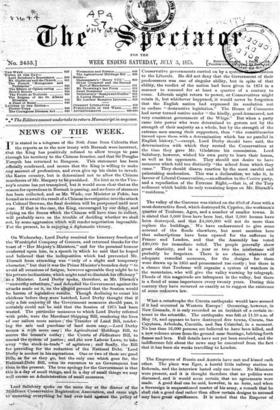On Wednesday, Lord Derby received the honorary freedom of the
Worshipful Company of Grocers, and returned thanks for the -toast of "Her Majesty's Ministers," and for the personal honour -conferred upon him, in a speech in which he said that he hoped and believed that the indisposition which had prevented Mr. Disraeli from attending was "only of a alight and temporary character," but that it was the Prime Minister's botuiden duty.'" to avoid all occasions of fatigue, however agreeable they might be to '• his private inclinations, which might tend to diminish his efficiency" a Minister. Lord Derby spoke, 'therefore, as Mr. Disraeli's 'unworthy substitute," and defended the GoVernment against the attacks made on it, on the alleged ground that the Session wcitild 'be barren of legislative results. Though declining to count his -chickens • before they were hatched, Lord Derby thought that if
• only a fair majority Of the Government measures should pass, it certainly Could not be said that the Session of 1875 had been wasted. The particular measures to which Lord Derby referred -with pride, were the Merchant Shipping.Bill, rendering the lives of our Sailors more secure ; the Transfer Of Laud Bill, render- ing the sale and purchase of -land More easy,--Lord:Derby means a trifle more easy, the Agricultural Holdings Bill, to -secure the tenant's outlay ; the Colitis of Afdiaature Bill, to amend the system of justice ; and .,the new Labour Laws,.-to•take away "the stock-in-trade" of agitators ; and finally, the -Bill for providing for the reduction of the National Debt. 'Lord Derby is modest in his aspirations. One or two of there are good Bills, as far as they go, but the only one which goes' far, the National-Debt Bill, owes its resources to no Government. less
-: than to the present. The true apology for the Government is that this is a day of small things, and in a day of small things we may
-well excuse an Administration of small measures. •


































